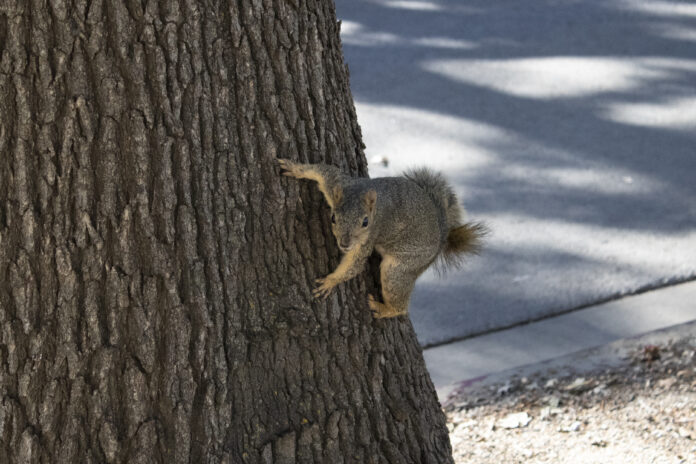Studies suggest ways to curb squirrel infestations and explain how personality affects squirrel behavior
By SHRADDHA JHINGAN — city@theaggie.org
Harper Junior High School, located in the Davis Joint Unified School District (DJUSD), has had a squirrel infestation that led to three of its fields becoming unusable, according to an article from the Davis Enterprise.
In 2008, UC Davis launched a research program to investigate how to stop a large increase in squirrel populations, specifically in tree squirrels that are non-native. Sara Krause, a doctoral student at UC Davis who led the project, explained in the news statement that at the time, there was a large increase in the number of eastern fox squirrels, to more than 400.
“This is an introduced species that has demonstrated elsewhere that it is prolific, adaptable, invasive and problematic for many reasons,” Krause said in the news statement.
The news statement also lists the impacts that the eastern fox squirrels could have on the campus, such as competing with other plants and native plants or damaging facilities on campus. Though Harper Junior High School did not identify the breed of squirrels that was causing the infestation, the article explained that the infestation has prevented students from using the affected facilities, and thus, they are trying to find a solution, according to interim superintendent Matt Best.
“Since the summer, we’ve been working to mitigate the squirrel problem,” Best said in the Davis Enterprise article. “It’s a challenge that if you don’t have the infestation under control, you’re just throwing money away for maintenance.”
In the 2008 research program, division director Sal Genito explained that the aim was not to hurt the squirrel or wildlife.
“Our goal is not to hurt the animals that find our grounds so attractive,” Genito said in the news statement. “It is to limit their ecological and human-health impacts as effectively and humanely as possible.”
According to the Davis Enterprise article, the school board has been trying multiple methods to help curb the squirrel infestation, such as putting water and sand in the burrows, live-trapping and more. A recent UC Davis study, for which the news statement was published on Sept. 10, detailed that squirrels have personality traits, which can affect how they use space.
These four personality traits are “boldness, aggressiveness, activity and sociability,” according to the study’s YouTube video. According to the study, these traits can have an impact on “wildlife management,” especially when considering the additional impact that human activities can have. Jaclyn Aliperti, the lead author of the study, detailed this idea further in the news statement.
“This adds to the small but growing number of studies showing that individuals matter,” Aliperti said. “Accounting for personality in wildlife management may be especially important when predicting wildlife responses to new conditions, such as changes or destruction of habitat due to human activity.”
Abigail Garofal, an energy and environmental stewardship educator at the University of Illinois Extension, explained in a webinar part of the reason why squirrel populations are so extensive.
“Starting in Central Park, actually in New York City, they introduced gray squirrels, flying squirrels and chipmunks, and then they actually started doing this in other cities as well,” Garofal said. “And so these squirrels were so successful in this urban landscape that they actually ended up having to coal a few of the species back because they were actually causing damage to some of the park landscapes, but at that point, it was too late […] so we started incorporating new trees into new neighborhoods as cities expanded.”
Dirk Van Vuren, a professor of wildlife biology at UC Davis, explained that the habitat may be conducive for squirrels and that from Google Earth, there seems to be “some great squirrel habitat on the south side of the school.”
“California ground squirrels prefer open, grassy habitats,” Van Vuren said via email. “They need open habitats. Their food is herbaceous vegetation such as grasses, and the seeds they produce. They especially like grazed areas, but looking on Google Earth, it seems there are plenty of ag fields nearby, which might be a source of the squirrels.”
Van Vuren said that the increase in squirrel populations was in response to the environment. A good habitat can lead to an increase in the number of squirrels.
“These squirrels don’t often dig burrows in lawns, but they certainly like to live in nearby burrows, and feed on lawns,” Van Vuren said via email. “So, the setting of Harper seems to have provided good quality habitat for California ground squirrels, and they responded accordingly.”
Written by: Shraddha Jhingan — city@theaggie.org





